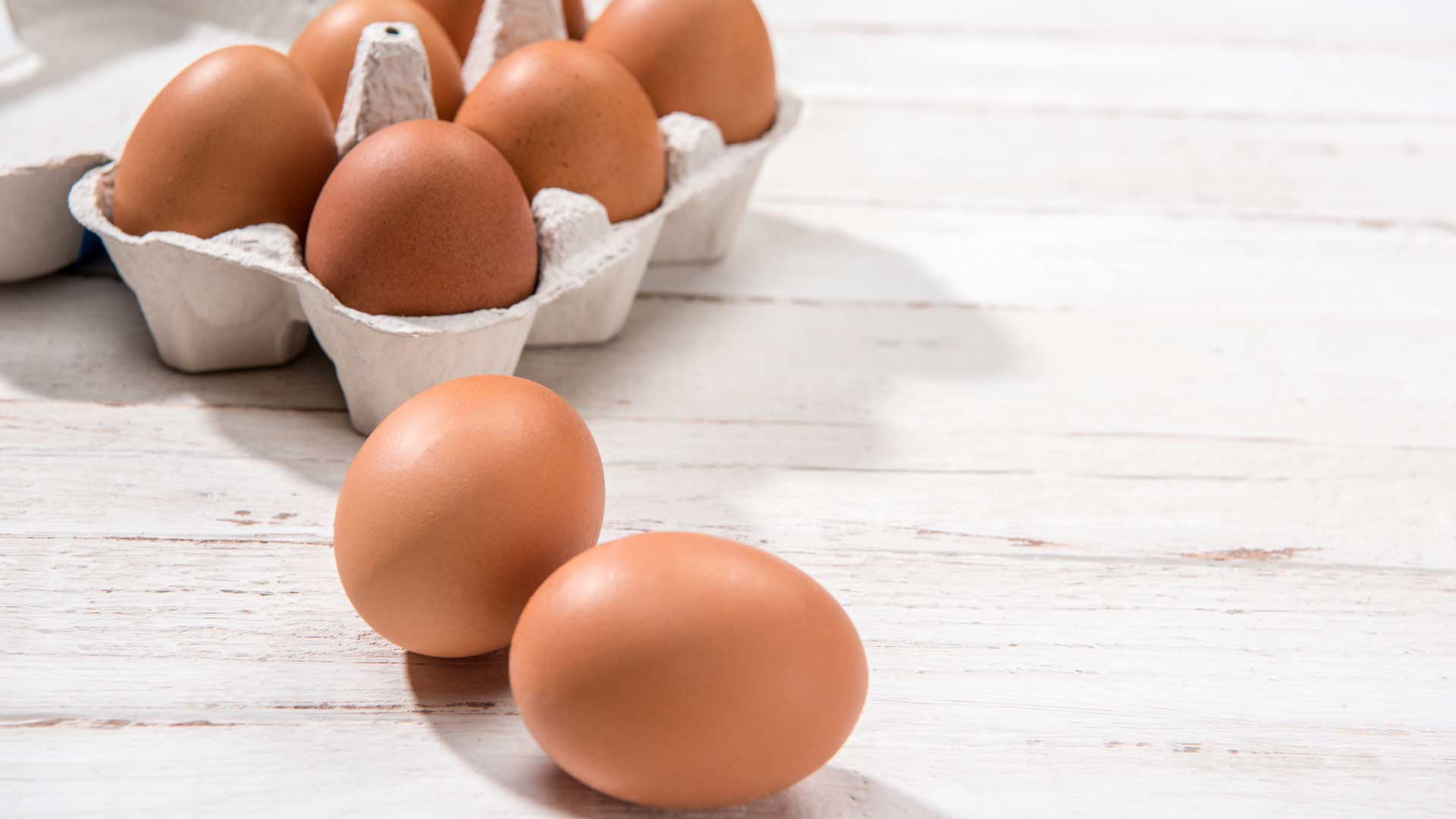World Egg Day 2021

Date
Location
Search Awareness Days
What is World Egg Day?
World Egg Day is an annual international campaign every second Friday in October that promotes the nutritional benefits of eggs in our diet and honours the farmers who care for the poultry which supply them. It was established by the International Egg Commission in 1996. This year the event is held on Friday, 8 October 2021.
The Commission calls eggs “an unbeatable package when it comes to versatility and top-quality protein at a very affordable price. And they are also an excellent source of choline, essential in memory and brain development. When you factor in convenience and terrific taste, there is just no competition.”
Healthline states “Eggs are pretty much nature’s perfect food” and Think Egg says they are “nature’s superfood”. Need we say any more?

With marketing materials to hand the organisers encourage businesses and organisations in the industry to make use of the opportunity to promote all things egg. Egg-related activities take place around the world in school, restaurants, markets, and on social media and the TV including cook-offs, festivals, recipes, seminars and more.
For example:
- Australia: Australian Eggs has hosted the Eggsellence Awards complete with celebrity chef and cook-off. Yum Yum Bakery from Sydney won the coveted award with its Awarma and Egg pizza: a warm flatbread baked with lamb confit a big runny egg on top, and then dusted with a light sprinkle of zataar
- Bangladesh: has hosted a consumer gathering to promote eggs, as well as distributed around 10,000 boiled eggs to those with low incomes, along with students, children, and females
- Columbia: broke the Guinness World Record for the largest scrambled egg to celebrate World Egg Day 2019. 59,758 eggs were used during the attempt, which helped to feed 15,000 vulnerable people in Soacha, Cundinamarca, at the event organised by Fenavi. A digital promotion also reached over 60,000 likes on World Egg Day with the ‘un like por mi día’ campaign
- Ghana: promoted ‘Eat your egg today and everyday’, and activities includeded a quiz for schools based on egg nutrition, the donation of eggs to hospitals with Children’s and Maternity wards, and a donation of 60,000 eggs which was distributed throughout the city
- Philippines: organise an annual ‘Eatlog Run’. In 2019 over two thousand runners took part in the race at SM by the Bay in Pasay City this year and participants were treated to a festive egg feast with various stations serving egg dishes around the course
- UK: World Egg Day was encompassed with British Egg Week. 2018’s theme of ‘Don’t get hangry, get cracking’ was to target the UK with recipe inspiration, the recipe inspiration included ‘Eggstra quick breakfasts’, ‘On the go lunches’ and ‘Power snacks’
- Vietnam: organised fun filled children’s activities such as egg shell painting, face painting, balloon blowing and food tasting, which took place at the Tay Ho Weekend Market in Hanoi
Egg Facts
According to Think Egg, the event’s official website and run by the International Egg Commission, it ponders some eggstraordinary egg facts:
- Eggs contain the highest quality protein you can buy
- To tell if an egg is raw or hard-cooked, spin it! If the egg spins easily, it is hard-cooked but if it wobbles, it is raw
- Egg yolks are one of the few foods that are a naturally good source of Vitamin D
- If an egg is accidentally dropped on the floor, sprinkle it heavily with salt for easy clean up
- Yolk colour depends on the diet of the hen
- Eggs age more in one day at room temperature than in one week in the refrigerator
- A large egg contains only 70 calories and 5 grams of fat
- Egg protein has just the right mix of essential amino acids needed by humans to build tissues. It is second only to mother’s milk for human nutrition
- An average hen lays 300 to 325 eggs a year
- To produce one egg, it takes a hen 24-26 hours
- As a hen grows older she produces larger eggs
- The fastest omelette maker in the world made 427 two-egg omelettes in 30 minutes. American Egg Board’s Howard Helmer, is the Omelette King; he holds three Guinness World Records for omelette making
Egg Labelling Terms
What do we mean by free range eggs, organic eggs and farm hens? Isn’t it all just marketing mumbo jumbo?
No. These terms are important for consumers and give them the right to choose where their food comes from and to buy products depending on how they’re made. They relate to how the hens are kept, live, and their welfare. Terminology may vary slightly from one country to another, e.g. between the USA and EU, but in the UK the industry body, Egg Info, labels eggs as being produced in four different ways:
- Laying cage systems: colony cages provide 750cm² per bird along with a nest box for the birds to lay their eggs in, perching space for the birds to sleep on and a scratching area to perform natural behaviours. In the UK, most of the new enriched colony cages are designed to contain between 40 and 80 birds, enabling better use of the space and giving them more room to move around the colony
- Barn egg production: maximum stocking density of 9 hens per square metre of useable area. Perches for the hens must be installed to allow 15 centimetres of perch per hen. Litter must account for one third of the ground surface. This is used for scratching and dust bathing
- Free range eggs: for eggs to be termed ‘free range’, hens must have continuous daytime access to runs which are mainly covered with vegetation and a maximum stocking density of 2,500 birds per hectare. The hen house conditions for free range hens must comply with the regulations for birds kept in barn systems, with a maximum stocking density of 9 hens per square metre of useable area.
Hens must be provided with nest boxes. Adequate perches, providing 15 centimetres of perch per hen, must also be provided. Litter must be provided, accounting for one-third of the ground surface – this is used for scratching and dust bathing.”
- Organic egg production: Hens producing organic eggs are always free range. In addition, hens must be fed an organically produced diet and ranged on organic land. Maximum stocking density of 6 hens per square metre of useable area and a maximum flock size of 3,000 birds. Hens must be provided with nest boxes
Health Benefits of Eggs
Eggs have to be one of the most widely used ingredients in eggsistence. They are full of nutrition, versatile for a huge range of recipes, easy to store, and easy to eat. While I’m not suggesting you break 10+ raw eggs into a glass and wolf it down like Rocky Balboa, eating an egg per day can be good for you as part of a balanced diet.

| Nutrition | Quantity | % Daily Value |
|---|---|---|
| Calories | 70 | |
| Total fat | 5g | 6% |
| Cholesterol | 185mg | 62% |
| Sodium | 70mg | 3% |
| Total carbohydrates | 0 | 0% |
| Protein | 6mg | 12% |
| Vitamin D | 1mcg | 6% |
| Calcium | 30mg | 2% |
| Iron | 0.9mg | 4% |
| Potassium | 70mg | 0% |
| Vitamin A | 80mcg | 8% |
| Riboflavin | 02mg | 15% |
| Niacin | 1.4mg | 8% |
| Vitamin B6 | 0.1mg | 6% |
| Vitamin B12 | 0.5mcg | 20% |
| Vitamin E | 0.5mcg | 4% |
| Folate | 25mcg DFE | 6% |
| Pantothenic Acid | 0.8mg | 15% |
| Phosphorus | 100mg | 8% |
| Iodine | 28mcg | 20% |
| Zinc | 0.7mg | 6% |
| Selenium | 15mcg | 25% |
| Biotin | 11mcg | 35% |
| Choline | 150mg | 25% |
We can see from the table above just how packed an egg is with nutrients, proteins, vitamins and fats. The health benefits of eggs are numerous to say the least. To summarise:
For a start, do not throw away the yolk. The Egg Nutrition Center says that most of the eggs’ nutrients and nearly half of the protein (just over 40%) is found in the yolk. Additionally, egg yolks carry various amounts of fat-soluble nutrients like vitamin D, E, A, and the antioxidants lutein/zeaxanthin. Plus, the fat, which is mostly unsaturated and found in the egg yolk, aids in the absorption of these essential and important egg components.
Choline is another superfood nutrient. The choline found in eggs boosts your brain and physical health, an essential nutrient for healthy memory, mood, and muscle control, and also helps reduce heart disease. Choline also safeguards women during pregnancy as a critical component for foetal brain development and helps to prevent birth defects.
Let’s continue. Eggs also provide a natural source of energy, keep the immune system healthy, lower the risk of heart disease, help prevent macular (eye) degeneration, and can assist in a weight loss and maintenance programme.
Eggs also raise the good HDL cholesterol in our body.
But don’t eggs raise your cholesterol level? Isn’t that bad for you?
In a word, no.
Research published in the British Medical Journal concluded that:
“Higher consumption of eggs (up to one egg per day) is not associated with increased risk of coronary heart disease or stroke. The increased risk of coronary heart disease among diabetic patients and reduced risk of hemorrhagic stroke associated with higher egg consumption in subgroup analyses warrant further studies.”
The British Heart Foundation also state that eggs don’t have an impact on cholesterol if eaten as part of a healthy diet:
“In the past it was thought that people should limit the number of eggs they eat to three to four a week because they contain cholesterol – It is the egg yolks that have the cholesterol. However, the misconceptions around eggs and cholesterol largely stemmed from incorrect conclusions drawn from early research that dietary cholesterol contributed to raised blood cholesterol levels.
… Eggs are, in fact, low in saturated fat. Recent research has also shown that moderate egg consumption – up to one a day – does not increase heart disease risk in healthy individuals and can be part of a healthy diet.”
Popular Types of Egg
I remember when I was a child I was asked what my favourite type of egg was. My brother said ‘fried’, my sister said ‘scrambled’, and I said ‘Easter’! I still think it’s a stroke of genius and it remains a great family joke.
Hen’s eggs are definitely the most popular type of egg but have you tried duck eggs, turkey eggs, goose eggs, quail eggs, pheasant eggs, ostrich eggs or emu eggs? They’re all part of the wonderful family of eggs we all know and love.
